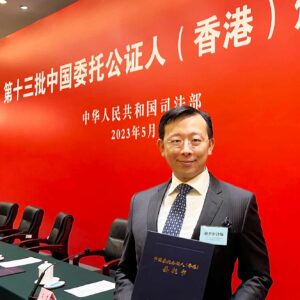Introduction
It is quite common for Hong Kong permanent residents to acquire property or keep bank accounts in Mainland China (PRC). Since Hong Kong and the PRC has different legal systems, sometimes Hong Kong citizens may have concerns if they plan to bequeathing such properties to their family or loved ones after they pass away.
In this article, we shall explore the matter of succession of estate in the PRC by looking into three different hypothetical scenarios and a discussion on some relevant statutory provisions in the PRC which may affect the estate succession.
Inheritance succession of deceased’s estate in the PRC
When dealing with cross-border estate inheritance, it is important to know which country’s law governs the inheritance process, and this depends on what type of asset it is. There are two main types of assets in an estate, immovable (i.e. flat, land) and movable assets (i.e. money, personal belongings). Generally succession to immovable assets are governed by the law of the place where the asset is located, while succession to movable assets are governed by the law of the deceased’s domicile at the date of death.
Scenario 1: The deceased has a will in Hong Kong governing estate in the PRC
If the deceased has a will in Hong Kong governing immovable asset in the PRC, the succession of the immovable asset is governed by the succession law of the PRC after the deceased passes away. According to the succession laws of the PRC, provided that the deceased’s will is valid, the executor of the will (once confirmed) will be responsible for the distribution of the deceased’s estate according to the will.
However, if the asset is movable, its succession is governed by the succession law of Hong Kong if the testator died domiciled in Hong Kong. According to the laws of Hong Kong, given that the will is valid, the executor of the will appointed (or named in the last will) has to apply for the Grant of Probate of the will at the Probate Registry in Hong Kong. If the grant is successful, the executor can distribute the deceased’s estate according to the will.
Scenario 2: The deceased does not have a will in Hong Kong but leaves assets in the PRC
If the deceased does not have a will (i.e. died intestate) and leaves immovable assets in PRC, the inheritance of the estate is governed by the succession laws of the PRC after he or she passes away. The order of priority of the inheritance is governed by Part 6 of the People’s Republic of China’s new Civil Code, which states that the successors first in order includes spouse, children and parents and the second in order includes siblings, paternal grandparents and maternal grandparents. When the succession starts, the first in order shall inherit to the exclusion of the successor(s) second in order, and the successor(s) second in order shall inherit in default of any successor first in order. Generally, successors with the same priority shall inherit in equal shares unless an agreement to take unequal shares is reached amongst themselves.
If there are movable assets in the PRC, the inheritance of the estate is governed by the succession law of Hong Kong if the testator died domiciled in Hong Kong. Generally, the order of priority of the right to apply for a Grant of Letters of Administration governed by Rule 21 of the Non-Contentious Probate Rules (Cap. 10A) is as follow:
- the spouse of the deceased;
- the children of the deceased;
- the father or mother of the deceased;
- the brothers and sisters of the deceased or the children of any deceased brother or sister of the deceased.
After the grant is made, he or she will become the administrator and will be responsible for performing the administrator’s duties including the distribution of the deceased’s estate according to the order of priority provided by the Intestates’ Estates Ordinance.
The order of priority for inheritance without a will in the PRC is slightly different from that in Hong Kong. Comparatively, it is much more difficult for parents of the deceased in Hong Kong to inherit the deceased’s estate compared to the PRC since it may only happen if the deceased has no children and there are remaining assets after the spouse has his or her entitled portion distributed (if the deceased has a spouse).
Scenario 3: The deceased has both a will in Hong Kong and the PRC governing a specific PRC asset
There is no restriction on having wills in two different countries. However, matters may be complicated if there are conflicts between them. If there is any conflict (E.g. the wills give different instructions for the succession of the same PRC asset), according to Article 1142 of the succession law of the PRC, where several wills are made and the contents conflict with each other, the one made last in time shall prevail. For instance, if the deceased have both a will in Hong Kong and in the PRC giving conflicting instructions on the disposal of the same PRC asset, the matter of which will should prevail depends on when each will was made. The latest will governing would prevail and replace the other. Please be reminded that if the law governing the two wills are different, the rule aforementioned may not apply and you are recommended to seek further legal advice for such a case.
Statutory provisions that may affect the estate succession in the PRC
Some statutory provisions in the PRC may affect the process of estate succession. Marriage Law is one of the examples.
On a basic reading of Article 41 of the Marriage Law of the People’s Republic of China, it would appear that if the husband and wife incurred debts during their marriage, at the time of divorce such debts should be repaid by them jointly. If their joint property is not enough to pay off the debts, and no agreement can be made between the two parties regarding such payment of debts, the court shall determine how the debts are repaid.
Disclaimer: This article is for reference only. Nothing herein shall be construed as legal advice, whether generally or for any specific person. Oldham, Li & Nie shall not be held liable for any loss and/or damage incurred by any person acting as a result of the materials contained in this article.
 Suite 503, 5/F, St. George's Building, 2 Ice House Street, Central, Hong Kong
Suite 503, 5/F, St. George's Building, 2 Ice House Street, Central, Hong Kong +852 2868 0696
+852 2868 0696










